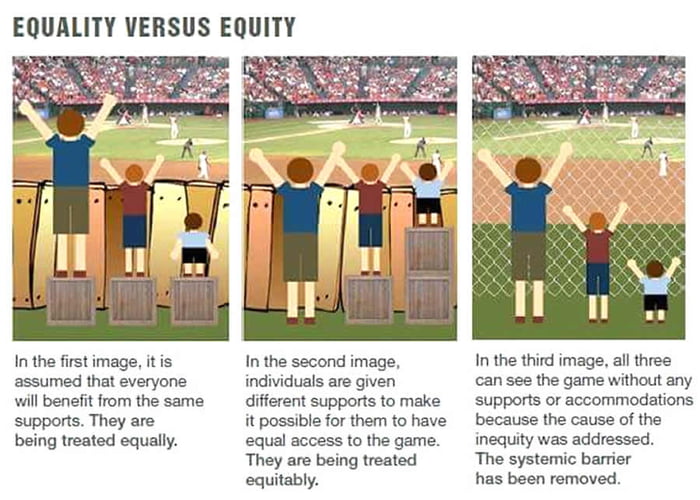It's a pretty helpful illustration for differentiating between two somewhat confusingly similar terms. I've most commonly seen it used in the context of social, political, and economical discussions [where it is certainly relevant], but it came to mind in a different way a few weeks ago when I came across Psalms 98:9 "for he cometh to judge the earth: with righteousness shall he judge the world, and the people with equity." [As a side note, why did I decide to read the Old Testament from start to finish? Guys, this thing is long.] With this terminology in the back of my mind, this verse stuck out to me.
When we discuss equity of resources do we include patience, charity, and service on the list of things that people need? We ought to, especially because in our own day-to-day lives these are the resources that we are most able to provide. In our interactions with other people are we being equal or equitable? We've all been born into unique circumstances, with different privileges and challenges, and, because our own circumstance is the only one we really know, it's really easy to fall into the habit of holding others to the same standards that we expect to meet, regardless of their personal circumstances.
The thing is, it's easier to enact equality in our own lives than it is to use equity. Equality in our interactions with other people is a blanket behavior, everyone is given the same things, held to the same standard, etc. To utilize equity in our relationships requires us to actually have relationships with those around us. Heavenly Father can judge us in equity because He knows each of us. He knows our circumstances, our resources, our intents. We cannot truly serve and love those around us unless we come to know them, in some way, and see them the way He does.
I am far from being proficient at this. We live in a world that encourages and constantly bombards us with snap judgments—a thought process that I've seen sneaking into my life more and more. That's not the kind of person I want to be. Thankfully, I will always have a choice in that, and a loving Heavenly Father who will encourage my every effort to improve.

equity. How much a person has invested in their house. ? So, how much does a person have invested in their life? Therefore, you don't judge the outcome, but the investment (or effort)? A person may be a total screw-up, BUT they have worked really hard to improve and they have not given up in spite of being really far behind. Equity or equality... even people I think I know really well, I've learned I can't really answer for their actions good or bad. I can stand on the sideline and cheer, but it is really between them and God as to how well they are doing. I'm guessing I missed your point... although it was still interesting reading.
ReplyDeleteI don't think you missed it at all :) The type of equity related to a house is a slightly different definition from what I was talking about, but your analogy makes sense too. And I think it ties in, because that is how Heavenly Father judges us, right? By our effort, what we put in, not just the result. I was mostly getting at the fact that we *can't* judge others [which you have aptly pointed out], but that the way we treat others should try to take into account their circumstances when possible. Like there are those that maybe need a greater degree of patience from us, because they struggle with addiction/mental illness/etc. So I don't think you missed it, you're just added another point to the same conversation :)
Delete